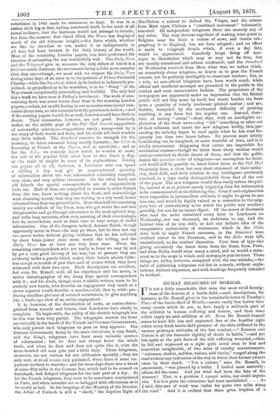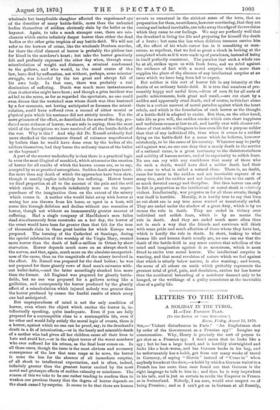HUMAN MEASURES OF HORROR.
IT is not a little remarkable that even the most vivid descrip- tions of the horrors of a battle-field,—such descriptions, for instance, as Dr. Russell gives in the remarkable letter in Tuesday's Times of the battle-field of Worth,—excite vastly less horror than many events which do not, in fact, imply a millionth part of the addition to human suffering and sorrow, and than some which imply no such addition at all. Even Dr. Russell himself seems to have felt less and expressed less at the familiar sight which every fresh battle-field presents of the slain stiffened in the various grotesque attitudes of the last combat,—" Zouaves and Turcos in all the fantastic rigidity of death in battle,"—and yet less again at the pale faces of the still suffering wounded,—than he felt and expressed at a sight quite novel even to him and somewhat inexplicable, of two miles of cavalry accoutrements, "cuirasses, shakos, saddles, valises, and tunics," ranged along the road without any indication of the way in which their former owners came by their death. " Not a cuirass," says Dr. Russell, in amazement, " was pierced by a bullet. I looked most narrowly ; others did the same. And yet what had been the fate of the wearers? That is a problem I cannot solve, nor could anyone else. Yet it is plain the cuirassiers had been annihilated. . . . As I said, this sort of work was visible for quite two miles along the road." And it is evident that these grim trophies of a wholesale but inexplicable slaughter affected the experienced eye of the describer of many battle-fields, more than the unburied bodies themselves of soldiers obviously slain by the bullet or the bayonet. Again, to take a much stronger case, there are mis- chances which excite infinitely deeper horror than either the dead bodies or the other grim trophies of any battle-field. We will not refer to the horrors of crime, like the wholesale Denham murder, for there the chief element of horror is probably the pitiless lust for blood in the murderer's heart ; but take the horror genuinely felt and profinely expressed the other day when, through some miscalculation of weight and distance, a criminal condemned to the gallows, and who would, in the usual course of the law, have died by suffocation, not without, perhaps, some minutes' struggle, was beheaded by the too great and abrupt fall of his own body. In that case, there was probably a real -diminution of suffering. Death was much more instantaneous than it otherwise might have been ; and though a grim incident was added to the scene, as far as regarded the spectators, no one could .even dream that the wretched man whose death was thus hastened by a few moments, not having anticipated or foreseen the miscal- culation, could have suffered even a second of either mental or physical pain which his sentence did not strictly involve. Yet the mere grimness of the effect, as described in the news of the day, pro- duced more sickness of horror, we are safe in saying, than the most vivid of the descriptions we have received of all the battle-fields of the war. Why is this? And why did Dr. Russell evidently feel more shocked at the continuous thread of cuirasses unperforated by bullets than he would have done even by the bodies of the soldiers themselves, had they borne the ordinary traces of the bullet or the bayonet?
A part of the answer undoubtedly is that there is a practical logic -in even the most illogical of mankind, which attenuates the emotion -of horror for all results of which the known causes are, so to say, .accepted by us as practical assumptions. Sudden death always horri- fies more than any death of which the approaches have been slow, though it usually implies infinitely less suffering. Horror bears no fixed proportion at all to the amount of the pain and the evil which excite it. It depends indefinitely more on the unpre- Taredness of the imagination than on the extent of the misery -which causes it. A mother who would faint away with horror at seeing her son thrown from his horse, or upset in a boat, will nurse him through delirium and decline without one sensation of horror, though not without an immeasurably greater amount of .suffering. Had a single company of MacMahon's men fallen dead simultaneously from sunstroke on a hot day, the horror of the event would have been far greater than that felt for the tens -of thousands slain in those great battles for which Europe was .prepared. The burning of the Cathedral at Santiago, during the special celebration of the worship of the Virgin Mary, created -more horror than the death of half-a-million in Orissa by sheer -starvation. Horror depends much more on an abrupt shock to the nerves, and that, again, much more on the absolute unexpected- ness of the cause, than on the magnitude of the misery involved in the effect. Dr. Russell was prepared for the dead bodies ; he was -not prepared for those ghastly rows of dead men's cuirasses with- -out bullet-holes,—and the latter accordingly shocked him more than the former. All England was prepared for ghastly battle- fields, but no one was prepared for a gallows acting like a guillotine, and consequently the horror produced by the ghastly -effect of a miscalculation which injured nobody was greater than the horror produced by causes the fearful results of which every -one had anticipated.
But unpreparedness of mind is not the only condition of horror, even where the object which excites the horror is, in- tellectually speaking, quite inadequate. Even if you are fully prepared for a contemptible close to a contemptible life, even if no other end would fully satisfy the moral logic of events, there is 4% horror, against which no one can be proof, say, in the drunkard's death in a fit of intoxication,—or in the lonely and miserable death of a mother who had given all her children cause all their lives to hate and avoid her,—or in the abject terror of the worst murderer who ever suffered for his crimes, as the final hour comes on. In all these cases, though the issue is the moat obvious and necessary consequence of the law that man reaps as he sows, the horror as none the leas for the absence of all immediate surprise, of all shock to intellectual expectation, and is often, indeed, infinitely greater than the greatest horror excited by the moat novel and grotesque effects of sudden calamity or mischance. The reason of this we take to be one rather tending to confirm than to weaken our previous theory that the degree of horror depends on the shock caused by-surprise. It seems to be that there are human
events so unnatural in the strictest sense of the term, that no preparation for them, no evidence, however convincing, that they are coming and indeed inevitable, can take away the edge of the revulsion which they cause to our feelings. We may see perfectly well that the drunkard is living the life and preparing for himself the death of a brute ; but none the less when delirium tremens carries him off, the effect of his whole career has in it something so mon- strous, so repellent, that we feel as great a shock in looking at the completed whole as if it were made up of paradoxes, instead of being in itself perfectly consistent. The paradox that such a whole can be at all, strikes upon us with fresh force, and we rebel against the evidence of fact with a moral surprise which more than supplies the place of the absence of any intellectual surprise at an issue which we have long been led to expect.
But neither is this sort of horror felt in any intensity at the deaths of an ordinary battle-field. It is true that numbers of pre- sumably happy and useful lives, —lives of men fit for all sorts of pacific achievements, both great and small,—are cut short by a sudden and apparently cruel death, and of course, in this fact alone there is a certain amount of moral paradox against which the heart rebels, and which is the foundation of such horror as the thought of a battle-field is adapted to excite. But then, on the other hand, take life as you will, the sudden stroke which cuts short happiness and usefulness comes at last to all, and hardly ever with clearer evi- dence of that noble willingness to lose even life for a purpose nobler than that of any individual life, than when it comes to a soldier dying on the battle-field for a cause which he believes, however mistakenly, to be the cause of his country. Whatever may be justly said against war, no one can deny that a manly death in the service of a national cause, is a great testimony to the disinterestedness and nobility of human nature, and of its superiority to selfish fears. No one can say with any confidence that many of those who die such a death, would have died a nobler death had their life come to what is called a natural close. There is, no doubt, cause for horror in the sudden and not inevitable rupture of so many ties, and the sudden and not inevitable loss to the earth of so much devoted energy and discipline. But then horror can only be felt in proportion as the intellectual or moral shock is relatively violent. Intellectually, war prepares us for all these events, though war itself is horrible. Morally, it is hardly true to say that lives so cut short are in any true sense wasted or unnaturally ended. They are ended under the shadow of a great duty, which is by no means the rule in death. They are ended in victory over individual and selfish fears, which is by no means the rule in death. And they are ended much more often than not in such a way that the friends and survivors will think with some pride and much affection of those whom they have lost, which is hardly the rule in death. In short, looking to what human life and human death usually are, no one can say that the death of the battle-field in any sense excites that rebellion of the mind and imagination against it as monstrous, which is most fitted to excite true moral horror. The intellectual surprise is wanting, and that moral revulsion of nature which we feel against that which is utterly below nature, is also wanting ; and hence, the scene of all others on earth which probably represents the greatest total of grief, pain, and desolation, excites far less horror than the accidental beheading of a murderer doomed only to be hanged, or the writhings of a guilty conscience at the inevitable close of a guilty life.































 Previous page
Previous page